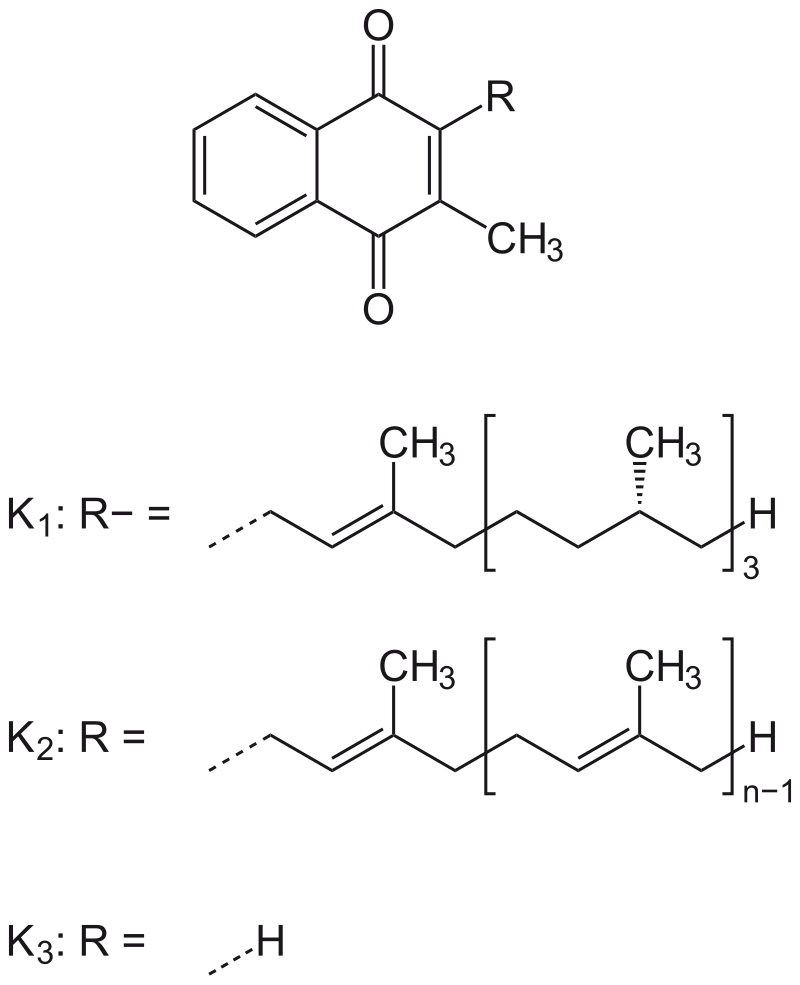Last Updated: 19 September 2022

Figure 1. The chemical structure of various forms of Vitamin K.
Vitamin K refers to a group of fat-soluble compounds. Vitamin K occurs in two natural forms, mainly Vitamin K1 (phylloquinone) and Vitamin K2 (menaquinone). Vitamin K3 (menadione) is a synthetic form of Vitamin K and was synthesised to treat Vitamin K deficiency. However, as Vitamin K3 interferes with the functioning of gluthathione, an antioxidant, Vitamin K3 is no longer used in this way in human nutrition.
In the human body, Vitamin K is required for post-synthesis modification of certain proteins that are necessary for blood coagulation and for controlling the binding of calcium in bones and other tissues. Prothrombin is a Vitamin K-dependent protein directly involved with blood clotting. Osteocalcin is another protein that requires Vitamin K to produce healthy bone tissue. Without Vitamin K, blood coagulation is seriously impaired and uncontrolled bleeding may occur. Research suggests that Vitamin K deficiency may also weaken bones, potentially contributing to osteoporosis, and may promote calcification (or hardening) of arteries and other soft tissues.
Vitamin K1 is synthesised by plants. Vitamin K1 is biologically active in animals and performs the classic functions of Vitamin K, including the production of blood-clotting proteins. Animals and bacteria in the gut flora may convert Vitamin K1 to Vitamin K2, variant MK-4. Other forms of Vitamin K2 can only be produced by bacteria, which are then used during anaerobic respiration.
Green leafy vegetables are a good source of Vitamin K1 (phylloquinone):
Vitamin K2 (menaquinones) can be found in some fermented and dairy foods:
As a dietary supplement, Vitamin K is used to treat Vitamin K deficiency. Vitamin K deficiency in adults is rare, but may occur in people taking medications that block Vitamin K metabolism such as antibiotics (which destroys gut flora), or in those with conditions that cause malabsorption of food and nutrients. A deficiency is also possible in newborn infants because Vitamin K does not cross the placenta, and breast milk contains a low amount of it. Symptoms of Vitamin K deficiency may include prolonged blood clotting, excessive bleeding, haemorrhaging, osteopenia or osteoporosis.
Vitamin K is found throughout the body including the liver, brain, heart, pancreas, and bone. It is broken down very quickly and excreted in urine or stool. Because of this, it rarely reaches toxic levels in the body even with high intakes, as may sometimes occur with other fat soluble vitamins.
The Recommended Dietary Allowance for Vitamin K for adults 19 years and older is 120mcg daily for men and 90mcg for women, including those who are pregnant or lactating.
Sources and Citations:
* Please be advised: always seek medical consultation if you require medical help or attention. The contents of this Codex are for educational purposes and are not intended to offer personal medical advice.